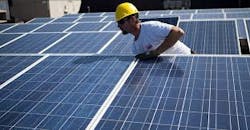106,000 Clean Energy Jobs Lost in March Due to COVID-19 Economic Crisis
More than 106,000 clean energy workers lost their jobs in the month of March, according to a new analysis released on April 15 by E2 (Environmental Entrepreneurs), the American Council on Renewable Energy, E4TheFuture and BW Research Partnership.
And hundreds of thousands more clean energy job losses are projected in the coming months.
The analysis of Department of Labor data found that 106,472 workers in clean energy occupations filed for unemployment benefits last month, wiping out all 2019 clean energy job gains across renewable energy, energy efficiency, clean vehicles, energy storage and clean fuels. These include electricians, HVAC and mechanical trades technicians and construction workers who work in energy efficiency; solar installers; wind industry engineers and technicians; and manufacturing workers employed by electric and other clean- vehicle manufacturing companies and suppliers.
The March layoffs are just the first indication of how badly the clean energy industry will be hit by the crisis, with the analysis projecting that more than 500,000 clean energy workers – 15% of the entire clean energy workforce – will lose their jobs in the months ahead unless Congress and the Trump administration take quick and substantive action.
A loss of that magnitude would erase the clean energy industry’s total job growth over the last five years.
"The economic fallout from COVID-19 is historic in both size and speed,” said Phil Jordan, principal at BW Research Partnership “Activities across the entire range of clean energy activities, from manufacturing electric vehicles to installing solar panels, are being impacted. And the data pretty clearly indicate that this is just the beginning.”
Clean energy has been one of the U.S. economy’s biggest and fastest-growing employment sectors over the past decade, growing 10.4% since 2015.
According to a separate report, Clean Jobs America 2020, released on April 15 by E2 U.S. clean energy jobs increased to nearly 3.4 million at the end of 2019. The report found the industry accounted for more than half of the entire energy sector’s job growth in 2019, adding more than 70,000 jobs for a 2.2% growth rate – a faster pace than the U.S. workforce as a whole.
Industries Hit Hardest
According to the unemployment data analysis, energy efficiency lost more jobs than any other sector of the clean energy industry in March, with nearly 70,000 people losing their jobs. The losses in the energy efficiency sector accounted for about two-thirds of all clean energy unemployment filings – as electricians, plumbers, construction workers, energy auditors and others were unable to enter homes, offices and other buildings because of coronavirus quarantines.
Renewable energy lost more than 16,000 lost jobs, and filings are expected to increase substantially in the coming weeks as solar and wind energy companies struggle with sudden and massive financing issues that are resulting in canceled and delayed projects.
The clean vehicle sector was also severely impacted, losing 12,000 jobs in factories that manufacture electric and hybrid vehicles and the parts that go in them. This represents the largest percentage job loss —4.5% — of any clean energy sector. This does not include the 20,000 workers that Tesla Inc. furloughed, or other losses posted after this March data was collected.
States Hit Across Country
States that lost the most jobs include California (19,949), North Carolina (6,800), Pennsylvania (6068), Massachusetts (5,611) and Michigan (5,446). Overall 26 states saw job losses rise above 1,000, according to the analysis.
For a full breakdown of clean energy jobs losses in each state, see full analysis here.
Growth Trend Upended
The widespread layoffs in clean energy risk derailing an industry that was leading the country in job creation. At the start of 2020, clean energy employment increased for the fifth straight year, growing to nearly 3.4 million workers nationwide. Renewable energy led the way, increasing 3.2% to about 523,000 jobs.
Energy efficiency continues to be the single largest section of the clean energy economy, employing 2.4 million Americans at the end of 2019, up 2.3% from 2018 despite federal rollbacks and delays of energy efficiency standards.
The clean vehicle sector was the only clean energy sector that saw job declines in 2019, dropping 2.3% to more than 266,000 jobs, in part because of industry uncertainty about rollbacks of federal vehicle emissions and mileage standards, which were recently finalized. The sector’s job losses come after a record-setting year in 2018 that saw the clean vehicle industry grow 17% and add more than 40,000 jobs.
About the Author
IW Staff
Find contact information for the IndustryWeek staff: Contact IndustryWeek
